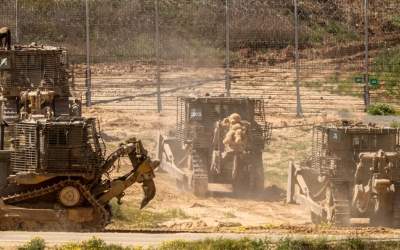US and Israel differ on Rafah invasion, as ceasefire talks come to a head

The US indicated that Israel was keeping it in the dark over its planned invasion of Rafah, the southern city in the Gaza Strip, saying it had not been informed of Israel’s planned offensive despite Prime Minister Benjamin Netanyahu announcing that a date was set.
US State Department spokesperson Matthew Miller said during a press briefing that the US has not been briefed on a date for Israel's invasion of Rafah.
"We have made clear to Israel that we think a full-scale military invasion of Rafah would have an enormously harmful effect on those civilians and that it would ultimately hurt Israel's security," Miller said, responding to Netanyahu’s remarks that the “[assault] will happen - there is a date”.
Netanyahu’s remarks came after the White House said that negotiators had presented Hamas a proposal after ceasefire talks in Cairo over the weekend.
The first part of the deal would see 42 women, children and elderly hostages released by Hamas in exchange for 800 to 900 Palestinian prisoners, 100 of whom are serving life or long sentences in Israeli jails, AFP reported, citing a Hamas source.
The second stage includes the release of all Israeli prisoners, including soldiers and officers, in exchange for a number of Palestinian prisoners, to be agreed upon in the coming days, the source added.
The US has also thrown its weight behind a proposal for up to 150,000 forcibly displaced Palestinians to return to northern Gaza. Ensuring the safe return of Palestinian refugees in southern Gaza to the north has been a key demand of Hamas, but has been opposed by Israel.
The negotiations come at a critical time, with US President Joe Biden last week calling for the first time for an immediate ceasefire in Gaza, following three Israeli strikes that killed seven aid workers of the World Central Kitchen.
There have also gradually been changes on the battlefield in Gaza. Israel announced it had pulled most of its troops from Khan Younis, even as it continued to pummel the area with air strikes. Israel said its 98th commando division was pulling out “in order to recuperate and prepare for future operations”.
'America is responsible'
Israel said that one brigade would continue to operate in the south of Gaza. A brigade typically has a few thousand troops, which means Israel has substantially reduced the roughly 50,000 troops it had operating in Gaza at the height of its ground presence.
The drawdown comes as tensions in the Middle East are at a high. Last week, Israel attacked Iran’s embassy in Damascus, Syria, killing Mohammad Reza Zahedi and Mohammad Hadi Haji Rahimi, both senior commanders in the Quds Force, the Islamic Revolutionary Guard Corps' foreign operations arm.
Iran has vowed to respond in kind to the unprecedented attacks on a diplomatic compound. On Monday, Iranian Foreign Minister Hossein Amir-Abdollahian told reporters in Damascus that "America is responsible for this incident and must be held accountable”.
Officials in Washington have sought to distance the US from the strike. Miller said the US was still working to determine whether the embassy building attacked by Israel was an Iranian consular facility.
Diplomatic outposts are considered sovereign territory and protected under international law but can lose that protection if they are being used as military facilities. Iran said on Monday that they had inaugurated a new centre for consular services in Damascus.
The Syrian Observatory for Human Rights war monitor said 16 people were killed in the consulate strike: eight Iranians, five Syrians, one member of Lebanon's Hezbollah group, and two civilians.
Any legal justifications put forward by Washington are unlikely to assuage Tehran, which faces the stark choice of losing its deterrence against Israel if it doesn’t respond. An advisor to Iran's supreme leader warned on Sunday that Israel's embassies were "no longer safe" after the Damascus attack.
A hostage deal in Gaza could help cool tensions as the Muslim holiday marking the end of Ramadan, Eid al-Fitr, approaches, but would still leave the US and Israel dealing with a day-after plan for the Mediterranean enclave.
More than 32,000 Palestinians have been killed in Gaza, while survivors of Israel’s onslaught are facing famine and most infrastructure has been reduced to rubble.
Middle East Eye delivers independent and unrivalled coverage and analysis of the Middle East, North Africa and beyond. To learn more about republishing this content and the associated fees, please fill out this form. More about MEE can be found here.






